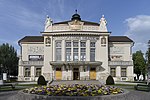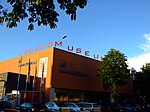Prince's Stone
Coronation stonesDuchy of CarinthiaIndividual thronesMedieval SloveniaPolitical history of Slovenia

The Prince's Stone (German: Fürstenstein, Slovene: knežji kamen) is the reversed base of an ancient Ionic column that played an important role in the ceremony surrounding the installation of the princes of Carantania in the Early Middle Ages. After the incorporation into the Frankish Empire, the procedure, held in Slovene, was continued as the first part of the coronation of the Dukes of Carinthia. It was followed by a mass at Maria Saal cathedral and the installation at the Duke's chair, where he swore an oath in German and received the homage of the estates.
Excerpt from the Wikipedia article Prince's Stone (License: CC BY-SA 3.0, Authors, Images).Prince's Stone
Landhaushof, Klagenfurt Innere Stadt
Geographical coordinates (GPS) Address Nearby Places Show on map
Geographical coordinates (GPS)
| Latitude | Longitude |
|---|---|
| N 46.6249 ° | E 14.3057 ° |
Address
Landhaus
Landhaushof
9020 Klagenfurt, Innere Stadt
Carinthia, Austria
Open on Google Maps









